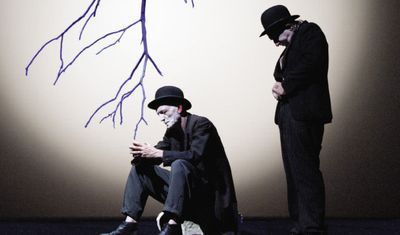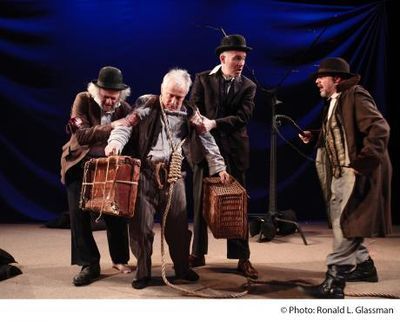Waiting for Godot . . . and waiting some more
By TOBY LICHTIG
One of the great pleasures of last week's Beckett festival was seeing Waiting for Godot twice in the same day. The prospect may strike some as gruelling but this couldn't be further from the truth.
A play so steeped in repetition and minor variation – not to mention boredom – naturally lends itself well to back-to-back performances, and these two productions contained enough by way of difference to make comparisons fascinating.
En Attendant Godot (with somewhat crowded English surtitles) is staged by the Théâtre Nono and directed by Marion Coutris. It courses with a subtle energy and a whiff of cabaret, from Estragon, with his face painted white, and the red-nosed buffon Vladimir, to Pozzo in his suspenders and boxer shorts. There is something wonderfully French about Vladimir's theatrically elongated way of calling out to his comrade: "Goggooooo".
A deep tenderness is established between the two eternal hobos, Vladimir stroking Estragon's feet as he helps him with his boots; and when they playfully mimic the slave and master ("On pourrait jouer à Pozzo et Lucky"), the sense is of a pair of children working through a trauma. The interplay between Pozzo and Lucky is similarly affecting, especially Lucky's physical performance as he sobs and gags, his dance at the end of Act I sliding into a comic grotesquerie that couldn't stop me from thinking of Ricky Gervais's infamous impersonation of MC Hammer in The Office.
Noël Vergès as Estragon and Christian Mazzuchini as Vladimir. Photograph: Cordula Treml
My only quibble with this excellent production is the unnecessary liberty taken with Beckett's very definite final stage direction: "They do not move" becomes "They move slowly off stage left". The stasis is respected at the end of Act I and it is hard to see what this interpretation adds.
The second version I saw was staged in Yiddish: suddenly the laconic, French Godot became a shrugging, Jewish one, the hobos remnants of a shattered Europe, communicating in a language rendered almost obsolete by genocide. In Vartn af Godot, staged by the New Yiddish Rep New York and directed by Moshe Yassur, the tree (which hangs surreally upside down in the Théâtre Nono's version) is a stark piece of metal piping; the sandbags around the stage are remnants of conflict; the ill-fitting shoes and trousers recall the deprivations of the concentration camps.
Yiddish, with its guttural vibrations, suits Godot very well, particularly at high moments of insult and exclamation. I particularly enjoyed the visceral “Alles drippit” (“Everything oozes”), “Zushmettert” (“appalled”), the boy’s shrugging “Ikh vis nit” (“I don't know”) and the notion that Godot may be coming for “Shabbos”. Pozzo’s “Happy days” is rendered as “L’chaim”. More jarringly, when Vladimir asks Estragon if he’s confusing the place they're thinking of with “the camp” (a line I can’t seem to find in my English edition of the play), the Yiddish “lager” carries with it a resonance that’s impossible to ignore.
David Mandelbauma as Estragon, Rafael Goldwaser as Lucky, Shane Barker as Vladimir, Allen Lewis Rickman as Pozzo
For all its interest, however, I found this version of the play less compelling than the French one. Riffing on the clichés of Yiddish paralinguistics, Shane Barker as Vladimir and David Mandelbaum as Estragon hammed it up a little too much, playing to the audience with facial ticks and gestures. Allen Lewis Rickman was a credible and overweeningly self-satisfied Pozzo, and it was instructive to compare Rafael Goldwaser's Lucky to Grégori Miege's one in En Attendant Godot. Goldwaser's presence was more minimalist than Miege's, his Lucky quietly broken, as opposed to grossly distorted. I found Miege's rather more persuasive.
One real treat of Vartn af Godot was the location: the old theatre at the Portora Royal School where Beckett was once a student (so too was Oscar Wilde, whose name was visible on the board of scholars). The thought of Beckett having once been in this hall, of his learning about theatre here, was not lost on the actors, whose joy was palpable in the speech they gave after the show.
Immersing myself in Godot, forgetting, at times, the language (I spent ten minutes ignoring the surtitles of the Yiddish version), was a thoroughly rewarding experience. By the time I headed home, reflecting on the four separate days on which Godot had failed to turn up, I was ready for a third version . . . perhaps this time in English.
Peter Stothard's Blog
- Peter Stothard's profile
- 30 followers





